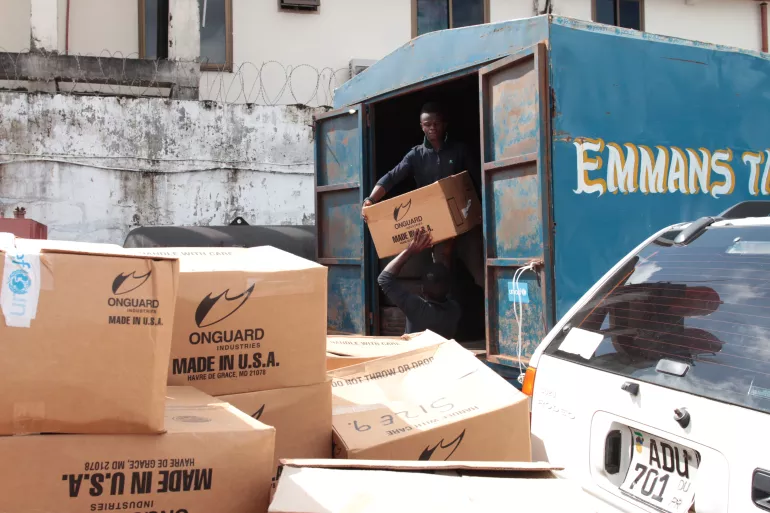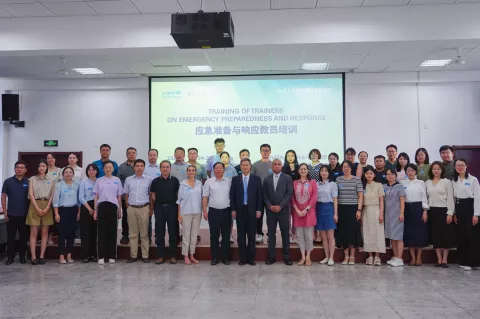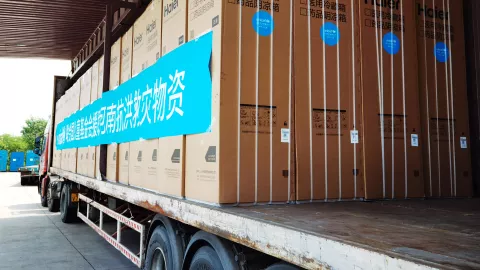UNICEF increases supplies from China to West Africa to support the emergency response for children

- Available in:
- 中文
- English
Beijing, 17 November 2014 – As UNICEF continues to expand its emergency response to the Ebola outbreak in the worst affected countries in West Africa, more urgently needed supplies are being procured and shipped from China.
UNICEF has sent almost 3,000 metric tonnes of life-saving supplies including protective equipment and essential medicine in the last three months to fight the spread of Ebola in Guinea, Liberia and Sierra Leone.
As one of the largest sources of supplies in the Ebola response, UNICEF has been working to increase the pipeline of protective personal equipment, body bags and tents, along with educational and hygiene supplies. Since July, an estimated USD6.9 million supplies worth has been procured and shipped from China and over the next few months, UNICEF foresees a regular shipment of 50 metric tons per week of items including body bags, aprons and apron hoods through cargo flights. This week alone, 34,200 aprons and hoods that form the basis of the personal protective equipment, needed by all health workers who come into contact with an Ebola infected patients, have been shipped from China.
In Sierra Leone, UNICEF is working with the Government to establish Community Care Centres that bring services closer to the community by providing safe isolated treatment options in communities which had seen an increase in Ebola cases.
“These 8-bed centers will allow those with the Ebola virus to be isolated within their communities, in a place where they can get basic care, free medicine, safe water and sanitation, and food supplies,” said Roeland Monasch, UNICEF Representative in Sierra Leone.
The centers will be run by the Government of Sierra Leone through their District Health Management Team, with local non-governmental organization World Hope International providing training, monitoring and social mobilization support. They will be staffed by trained health workers, equipped with personal protective equipment.
Construction followed extensive consultation with local authorities and traditional leaders to make sure they are an accepted and integrated part of local communities. As well as providing basic care and isolation, these will also serve as focal points for safe and dignified burials and activities to raise awareness among communities.
UNICEF is providing the tents, tarpaulins and construction materials to build the centres, along with the day-to-day supplies needed to keep health workers safe from infection and provide patients with supportive treatment. UNICEF is planning to have 40 such centers operational in neighbouring districts in the coming weeks.
HIGHLIGHTS OF UNICEF RESPONSE TO EBOLA
Awareness raising and behaviour change:
- With partners, UNICEF has been working with communities to help them better understand the disease: How it spreads, why it's essential to isolate suspected cases, and how to care for sick relatives.
- In Guinea, more than 528,000 families have been reached so far with life-saving messages through face to face interactions.
- In Liberia, approximately 1.5 million people were reached with messages through radio broadcasts, while 65,400 families reached through face to face interactions. So far, more than 4,800 teachers have been trained to deliver awareness messages door-to-door.
- In Sierra Leone, street-to-street announcements and home visits are being conducted in hotspot areas. The house-to-house campaign conducted back in September by the Government, with support from UNICEF and partners, reached over one million homes with life-saving messages. Additionally, UNICEF's water, sanitation and hygiene partners have reached close to 530,000 people with essential messages since June.
Outbreak control and case management support:
- UNICEF is one of the largest providers of essential supplies for use in Ebola treatment units (ETUs) and community care centres (CCCs). To date, UNICEF has delivered 3,000 metric tonnes of supplies including tents, protective equipment, gloves, safety goggles, intravenous IV fluids, medicines, bars of soap, concentrated chlorine, pickup trucks, motorbikes and ambulances.
- This week, 10 Ebola Community Care Centres (CCCs) will be opened in Sierra Leone, with 40 centres planned by end of November.
- UNICEF is providing water and sanitation support to ETUs in the three affected countries, including construction or repairs, equipment and supplies.
- In the districts of Bombali, Bo, Pujehun as well as new hotspot districts Koinadugu and Kambia in Sierra Leone, UNICEF supported newly established Ebola holding centres with essential water and sanitation package (waste management and water supply for drinking, rehydration and disinfection). To date, UNICEF supported 15 holding/treatment centres with water and sanitation facilities in eight districts in the country.
- In Liberia's Montserrado county, UNICEF continues to support 5 ETUs with water, sanitation, and hygiene supplies and will put in place a full package of WASH interventions in 65 CCCs.
- About 1.5 million bars of soap were distributed to families in Sierra Leone. UNICEF is currently distributing hygiene kits to 10,500 families in Margibi county, Liberia, adding to the 15,579 families in Monrovia who have so far benefited from the distribution.
- In Sierra Leone, a 15-day nutrition supply was provided to 375 Ebola patients in 5 ETUs, including 55 children. Nutrition supplies were also distributed in Liberia's Margibi county for patients in ETUs, CCCs and health facilities.
Provision of social services:
- 270 health facilities in key areas in Guinea and 134 in Liberia have so far received essential supplies for maternal, newborn and child health care and infection prevention and control.
- In Sierra Leone, UNICEF supported the Ministry of Health to train more than 270 health staff on infection prevention and control. A total of around 4,000 health staff and other workers will be trained.
- In Liberia, a total of 325 severely malnourished children under five were admitted to UNICEF-supported nutrition treatment facilities during the month of September alone, according to newly received (partial) data.
- More than 1,300 children in Liberia received psychosocial, family tracing, reunification and reintegration support. The reunification rate of children temporarily placed in the interim care centre and transit centre in Liberia is 98%, with almost all children having been reunified with their families or placed into foster care. In Sierra Leone, more than 400 children and caregivers affected by Ebola received psychosocial support, while close to 300 affected children have been reunified with families.
- With schools closed for a prolonged period, UNICEF is supporting radio education programmes in Guinea, Liberia, and Sierra Leone, providing children with a non-formal education curriculum.
Prevention and preparedness in neighbouring countries:
- UNICEF continues to support preparedness and prevention actions in the at risk neighbouring countries. Technical assistance is being provided for the development of comprehensive preparedness and response plans, while supporting national efforts to strengthen the health systems and assisting communities to be prepared in case of outbreak.
- In Core d'Ivoire, briefing sessions have been provided to 1,200 students and 22 social mobilisers for increased knowledge on Ebola, while 5,000 buckets, 5,000 taps, 3,600 cartons of bleach, 5,000 metal supports for hand washing facilities, and 5,000 boxes of soap bars have been procured. 25 tents have been provided to equip 12 treatment centers in Abidjan and in border areas with Liberia and Guinea.
Note to editors:
Last week in Copenhagen, a UNICEF-led consultation with partners and the personal protection equipment (PPE) industry was seen as a major step in forecasting the quantity of Ebola Personal Protective Equipment that will be needed in the months ahead. At minimum, a 30 percent gap was identified and therefore an increase in global production is urgently required by December.
Media contacts
About UNICEF
UNICEF works in some of the world's toughest places, to reach the world's most disadvantaged children. Across 190 countries and territories, we work for every child, everywhere, to build a better world for everyone. For more information about UNICEF and its work for children visit www.unicef.org.
| Visit UNICEF China website: www.unicef.cn Follow us on Sina Weibo: http://weibo.com/unicefchina Tencent Weibo: http://t.qq.com/unicef Wechat: unicefchina |



